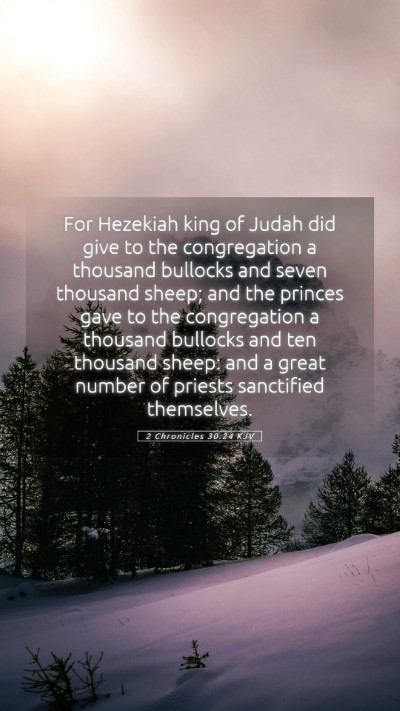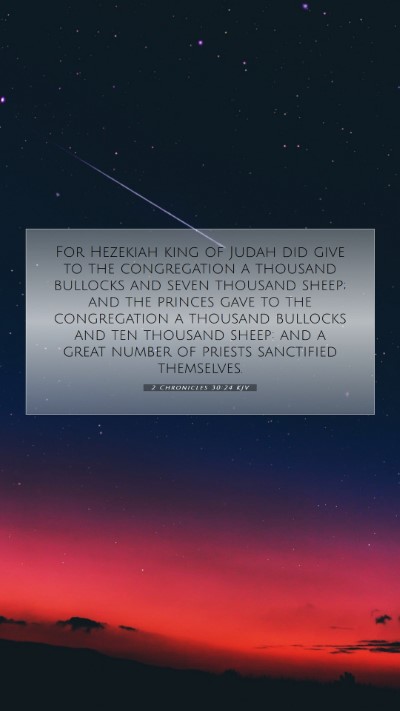Understanding 2 Chronicles 30:24: Insights and Interpretations
2 Chronicles 30:24 states: "For Hezekiah king of Judah gave to the congregation a thousand bullocks and seven thousand sheep; and the princes gave to the congregation a thousand bullocks and ten thousand sheep; and a great number of priests sanctified themselves." This verse encapsulates both a moment of celebration and the significance of worship among the people of Judah during a pivotal time in their history.
Context and Background
This verse occurs within the context of Hezekiah’s efforts to restore proper worship in Judah. After a period of neglect and idolatry, Hezekiah's religious reforms marked a return to the worship of Yahweh. This moment underscores the collective action of the king, his princes, and the congregation, showcasing a unity in their worship practices.
Interpretation and Commentary
- Matthew Henry's Commentary: Matthew Henry elaborates on the character of King Hezekiah as a pious leader, emphasizing his commitment to re-establishing the sacrificial system. The verse illustrates the substantial offerings made by both the king and the princes, which signifies the gravity of repentance and dedication to God. Henry points out that the large offerings were a reflection of a collective heart attuned to God’s will, restoring the temple's importance in national life.
- Albert Barnes' Notes: Albert Barnes emphasizes the communal aspect of worship in this verse. He notes that the significant sacrificial offerings came from both the king and the nobles—a clear demonstration of their shared responsibility and devotion to Yahweh. This cooperation between rulers and the people serves as a model for understanding the necessity of leadership in spiritual renewal and the importance of participation in communal worship.
- Adam Clarke's Commentary: Clarke provides additional insights regarding the nature and quantity of the offerings. He points out that the multitude of sacrifices reflects the joy and gratitude of the people for the restoration of their religious practices. Clarke comments on the sanctification process of the priests, highlighting the importance of spiritual readiness when approaching divine matters, which is essential for genuine worship.
Significance of Sacrificial Offerings
The offerings in this verse represent a response to God’s mercy and a desire to re-establish a covenant relationship with Him. Sacrifices were integral to worship in ancient Israel, serving as acts of devotion, repentance, and communal fellowship. In understanding this, we can draw parallels to modern expressions of worship and the emphasis on giving in our spiritual communities.
The Role of Leadership in Worship
Hezekiah's leadership illustrates the importance of guiding a nation back to true worship. His initiative in leading the people to sacrifice and worship serves as an example for present-day leaders in faith communities. It shows how leadership can mobilize collective action toward spiritual renewal.
Application for Today
For contemporary readers, this verse teaches the value of collective worship and the importance of giving as a response to God’s grace. It invites individuals to reflect on their roles within their spiritual communities and how they contribute to the life of the church through acts of service and sacrifice.
Cross References
- 2 Chronicles 29:31 - The call to worship and sacrifices.
- 2 Kings 18:4 - Hezekiah’s reforms and destruction of idols.
- Leviticus 23:37-38 - Instruction on offerings during festivals.
Concluding Thoughts
In summary, 2 Chronicles 30:24 serves as a powerful reminder of the significance of communal worship and the role of leaders in restoring and promoting a life of faith. Through the lens of biblical exegesis and scripture analysis, we find both historical context and timeless principles for today’s faith journey.
The interpretation of this verse also aligns with the broader themes of repentance, worship, and the importance of spiritual leaders, ultimately inviting us to engage in our faith deeply and meaningfully.


